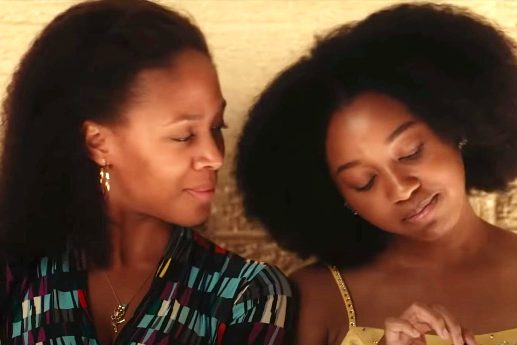
 A film by Channing Godfrey Peoples tells of a single mother (Nicole Beharie) in an African American neighborhood in Fort Worth, Texas, who wants her daughter to run in the Miss Juneteenth pageant, and must come to terms with her own past in the process.
A film by Channing Godfrey Peoples tells of a single mother (Nicole Beharie) in an African American neighborhood in Fort Worth, Texas, who wants her daughter to run in the Miss Juneteenth pageant, and must come to terms with her own past in the process.
Miss Juneteenth, the debut feature of writer/director Channing Godfrey Peoples, introduces us to Turquoise Jones, Turq for short, an African American single mother in her 30s played by Nicole Beharie. She lives in Fort Worth, Texas, and works two jobs, as a waitress in a barbecue joint and a cosmetician in a mortuary. But she is known by people in general for something in her past. Years ago she won the Miss Juneteenth pageant, a contest in Texas for African American girls, ages 15 through 18, which awards the winner a full scholarship to an historically black college. Most people who know her remember it fondly; but some remember it as a disappointment—Turq didn’t gain the success that other winning contestants went on to achieve. The main reason, perhaps, was the birth of her daughter Kai, which forced Turq to stay in her home town, but she doesn’t discuss the matter.
Juneteenth, for those who don’t know, is a holiday celebrating the emancipation of black Americans from slavery, specifically marking the June 19th, 1865 declaration by Federal troops in Texas, the last of the former Confederate states where there were still enslaved people, that slavery had been abolished. Naturally, it has a special resonance in Texas. The Miss Juneteenth pageant is a real thing. In scenes of the film showing all the preparations for the pageant, Peoples, the director, herself a Fort Worth native, casts a mildly humorous eye on the cultural rituals of this African American community. It’s not just about beauty. The winner must also demonstrate an understanding and appreciation of black history and struggle, along with academic and artistic talent, and even a working knowledge of etiquette.
Turq is determined that her teenage daughter will compete in the pageant, and to that end has scrimped and saved every penny she can. Kai, played by Alexis Chikaeze, wants to please her mother by entering the contest, but her real interests seem to be modern dance and hanging out with her boyfriend. She goes along, but at the same time resists the pressure to excel the way her mom wants, because she senses that her mother is using her to fulfill her own unmet ambitions.
But one of the best things about this movie is that the tension between mother and daughter is not dramatized as conflict in the way we typically see in films. Peoples portrays it as a normal aspect of the relationship. And despite the differences, Turq accepts her daughter and her daughter accepts her, and this comes through in the performances of the two actresses.
Turq still has affection for Kai’s father, a car mechanic named Ronnie, but he remains unreliable. Her own elderly mother is devoted to the church and fond of preaching, and at the same time has a drinking problem. Her strait-laced boss at the funeral parlor wants her to marry him—she respects him, but there’s no love. Her other boss, the owner of the barbecue joint, has seen too much disappointment in his life and is not shy with his opinions. “Ain’t no American dream for black folks,” he says, one of the film’s few references to the self-evident racial politics. Through it all, in the central role of Turq, Nicole Beharie carries the picture with grace and emotional transparency—she has a talent for letting us know what she’s thinking and feeling without saying a word, eloquent with her face and movements. She’s in almost every scene, and leaves us with an image of loving weary endurance that persists through any challenge. We witness the bond between mother and daughter clarified and made stronger. We see what the mother believes in and what the daughter fulfills.
Miss Juneteenth is a gentle, lovely film, worldly wise in the ways of imperfect people. It was just beginning its distribution after premiering at the Sundance Film Festival last year, when the pandemic hit and theaters closed. It is available streaming, and on DVD and Blu-ray, and it deserves a larger audience.

